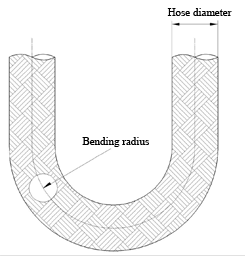1. Pressure
The stated pressures are categorised as admissible operating pressure at 20°C, test pressure and burst pressure.
Admissible operating pressure
=the maximum working pressure which may be applied to the hose under normal operating conditions (without factors). The working pressure increases with the number of braids.
Test pressure
= the test pressure is 1.5 times the working pressure
Burst pressure
= the burst pressure is 4 times the working pressure
Temperature reduction factor
The stated working pressures in our data sheets for stainless steel corrugated hoses are according EN ISO 10380 at room temperature (20°C). The Values reduce at increasing temperature according to the Table1.
| Table 1: Temperature reduction factor | ||||||||||||
|---|---|---|---|---|---|---|---|---|---|---|---|---|
| Temperature in °C | -200 up to 20 | 20 | 50 | 100 | 150 | 200 | 250 | 300 | 350 | 400 | 500 | 600 |
| AISI 316L | 1 | 1 | 0,90 | 0,73 | 0,67 | 0,61 | 0,58 | 0,53 | 0,51 | 0,50 | 0,47 | A* |
| AISI 316Ti | 1 | 1 | 0,92 | 0,80 | 0,76 | 0,72 | 0,68 | 0,64 | 0,62 | 0,60 | 0,58 | A* |
*On request.
The following formula is used to calculate the admissible operating pressure:
| Adm. operating pressure | = | working pressure | x | temperature factor | ||
| (Data sheet) | x | (Table 1) |
Example:
Hose type STDA – Material AISI 316L – nominal diameter ND 20 – Temperature +250°C
Working pressure acc. EN ISO 10380 at 20°C amounts to Data sheet:
- without braiding –> 2,5 bar
- single braiding –> 40 bar
- double braiding –> 65 bar
Adm. operating pressure at +250°C (single braiding) –> 40 bar x 0,58 = 23,2 BAR
Adm. operating pressure at +250°C (double braiding) –> 65 bar x 0,58 = 37,7 BAR
Please check the sufficient pressure resistance of your chosen fittings.
2. Bending radius

The compliance the bending radius is important for a long service life of the hose.
Please note the values of the data sheets.
Static bendingradius
= the smallest, theoretical bending radius for rigid fitted hose.
Dynamic bendingradius
= the smallest, theoretical bending radius for a moving fitted hose.
Set the hose with a larger bending radius, than a smaller one, because this would increase the service life.
Note! Our installation instructions must be heeded for all design!
During calculation the length of the hose and the bending radius, please regard to cinsider a straight piece after the fitting. Do not bend the hose directly after the fitting.
Please involve a straight length of min. 2 – 3 X nominal diameter
If the installation does not allow this, use a bend pipe, to avoid a strong kinking of the hose.
